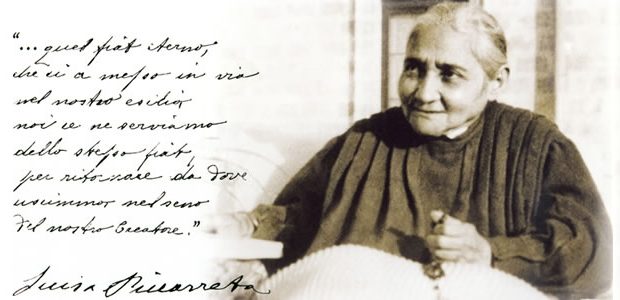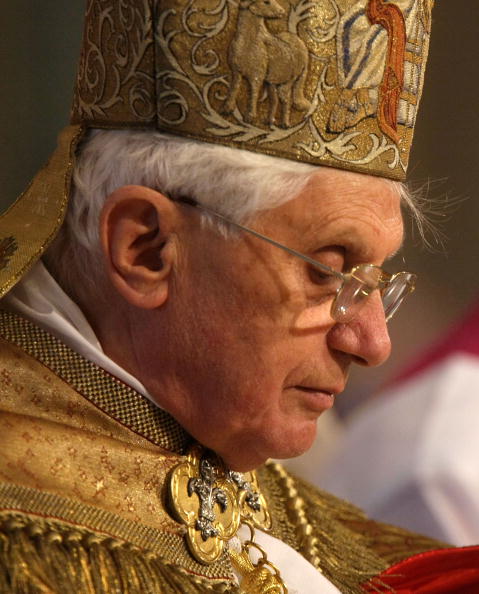BENEDICT XVI
GENERAL AUDIENCE
Paul VI Audience Hall
Wednesday, 1 February 2012
Dear Brothers and Sisters,
Today I would like to talk about Jesus’ prayer in the Garden of Olives at Gethsemane. The scenario of the Gospel narrative of this prayer is particularly significant. Jesus sets out for the Mount of Olives after the Last Supper while he is praying together with his disciples. The Evangelist Mark says: “when they had sung a hymn, they went out to the Mount of Olives” (Mk 14:26).
This is probably an allusion to singing one of the Hallel Psalms, with which thanks are given to God for the liberation of the People from slavery and his help is asked for the ever new difficulties and threats of the present. The walk to Gethsemane is punctuated by Jesus’ remarks that convey a sense of his impending death and proclaim the imminent dispersion of the disciples.
Having reached the grove on the Mount of Olives, that night too Jesus prepares for personal prayer. However, this time something new happens: it seems that he does not want to be left alone. Jesus would often withdraw from the crowd and from the disciples themselves “to a lonely place” (Mk 1:35) or he would go up “into the hills”, St Mark says (cf. Mk 6:46). Instead at Gethsemane he invites Peter, James and John to stay closer to him. They are the disciples he called upon to be with him on the Mount of the Transfiguration (cf. Mk 9:2-13). This closeness of the three during his prayer in Gethsemane is important. On that night too Jesus was going to pray to the Father “apart”, for his relationship with the Father is quite unique: It is the relationship of the Only-Begotten Son. Indeed, one might say that especially on that night no one could really have come close to the Son, who presented himself to the Father with his absolutely unique and exclusive identity.
Yet, although Jesus arrives “alone” at the place in which he was to stop and pray, he wants at least three disciples to be near him, to be in a closer relationship with him. This is a special closeness, a plea for solidarity at the moment in which he feels death approaching, but above all it is closeness in prayer, in a certain way to express harmony with him at the moment when he is preparing to do the Father’s will to the very end; and it is an invitation to every disciple to follow him on the Way of Cross.
Mark the Evangelist recounts: “he took with him Peter and James and John, and began to be greatly distressed and troubled. And he said to them ‘My soul is very sorrowful, even to death; remain here, and watch” (14:33-34).
In the words he addresses to the three, Jesus once again expresses himself in the language of the Psalms: “My soul is very sorrowful”, an expression borrowed from Psalm 43 (cf. Ps 43[42]:5). The firm determination “unto death” thus calls to mind a situation lived by many of those sent by God in the Old Testament and which is expressed in their prayers. Indeed, following the mission entrusted to them frequently means encountering hostility, rejection and persecution.
Moses is dramatically aware of the trial he is undergoing while guiding the people through the desert and says to God: “I am not able to carry all this people alone, the burden is too heavy for me. If you will deal thus with me, rather kill me at once, kill me if I have found favour in your sight, that I may not see my wretchedness” (cf. Num 11:14-15).
Elijah too finds doing his duty to God and to his People difficult. The first Book of Kings recounts: “he himself went a day’s journey into the wilderness, and came and sat under a broom tree; and he asked that he might die, saying, ‘It is enough; now, O Lord, take away my life; for I am no better than my fathers’” (19:4).
What Jesus says to the three disciples whom he wants near him during his prayer at Gethsemane shows that he feels fear and anguish in that “Hour”, experiencing his last profound loneliness precisely while God’s plan is being brought about. Moreover Jesus’ fear and anguish sums up the full horror of man in the face of his own death, the certainty that it is inescapable and a perception of the burden of evil that touches our lives.
After the invitation to stay with him to watch and pray which he addresses to the three, Jesus speaks to the Father “alone”. Mark the Evangelist tells us that “going a little farther, he fell on the ground and prayed that, if it were possible, the hour might pass from him” (14:35). Jesus fell prostrate on the ground: a position of prayer that expresses obedience to the Father and abandonment in him with complete trust. This gesture is repeated at the beginning of the celebration of the Passion, on Good Friday, as well as in monastic profession and in the ordination of deacons, priests and bishops in order to express, in prayer, corporally too, complete entrustment to God, trust in him. Jesus then asks the Father, if this be possible, to obtain that this hour pass from him. It is not only man’s fear and anguish in the face of death, but is the devastation of the Son of God who perceives the terrible mass of evil that he must take upon himself to overcome it, to deprive it of power.
Dear friends, in prayer we too should be able to lay before God our labours, the suffering of certain situations, of certain days, the daily commitment to following him, to being Christian, and also the weight of the evil that we see within ourselves and around us, so that he may give us hope and make us feel his closeness and give us a little light on the path of life.
Jesus continues his prayer: “Abba, Father, all things are possible to you; remove this cup from me; yet not what I will, but what you will” (Mk 14:36). In this invocation there are three revealing passages. At the beginning we have the double use the word with which Jesus addresses God: “Abba! Father!” (Mk 14:36a). We know well that the Aramaic word Abbà is the term that children use to address their father and hence that it expresses Jesus’ relationship with God, a relationship of tenderness, affection, trust and abandonment.
The second element is found in the central part of the invocation: awareness of the Father’s omnipotence: “all things are possible to you”, which introduces a request in which, once again, the drama of
Jesus’ human will appears as he faces death and evil: “remove this cup from me!”.
However, there is the third expression in Jesus’ prayer, and it is the crucial one, in which the human will adheres to the divine will without reserve. In fact, Jesus ends by saying forcefully: “yet not what I will but what you will” (Mk 14:36c). In the unity of the divine person of the Son, the human will finds its complete fulfilment in the total abandonment of the I to the You of the Father, called Abba.
St Maximus the Confessor says that ever since the moment of the creation of man and woman, the human will has been oriented to the divine will and that it is precisely in the “yes” to God that the human will is fully free and finds its fulfilment. Unfortunately, because of sin, this “yes” to God is transformed into opposition: Adam and Eve thought that the “no” to God was the crowning point of freedom, of being fully themselves.
On the Mount of Olives, Jesus brings the human will back to the unreserved “yes” to God; in him the natural will is fully integrated in the orientation that the Divine Person gives it. Jesus lives his life in accordance with the center of his Person: his being the Son of God. His human will is drawn into the I of the Son who abandons himself totally to the Father. Thus Jesus tells us that it is only by conforming our own will to the divine one that human beings attain their true height, that they become “divine”; only by coming out of ourselves, only in the “yes” to God, is Adam’s desire — and the desire of us all — to be completely free. It is what Jesus brings about at Gethsemane: in transferring the human will into the divine will the true man is born and we are redeemed.
The Compendium of the Catholic Church teaches concisely: “The prayer of Jesus during his agony in the Garden of Gethsemane and his last words on the Cross reveal the depth of his filial prayer. Jesus brings to completion the loving plan of the Father and takes upon himself all the anguish of humanity and all the petitions and intercessions of the history of salvation. He presents them to the Father who accepts them and answers them beyond all hope by raising his Son from the dead” (n. 543). Truly “nowhere else in Sacred Scripture do we gain so deep an insight into the inner mystery of Jesus as in the prayer on the Mount of Olives (Jesus of Nazareth, II, 2011, Ignatius Press, San Francisco, p. 157).
Dear brothers and sisters, every day in the prayer of the Our Father we ask the Lord: “thy will be done, on earth as it is in heaven” (Mt 6:10). In other words we recognize that there is a will of God with us and for us, a will of God for our life that must become every day, increasingly, the reference of our willing and of our being; we recognize moreover that “heaven” is where God’s will is done and where the “earth” becomes “heaven”, a place where love, goodness, truth and divine beauty are present, only if, on earth, God’s will is done.
In Jesus’ prayer to the Father on that terrible and marvellous night in Gethsemane, the “earth” became “heaven”; the “earth” of his human will, shaken by fear and anguish, was taken up by his divine will in such a way that God’s will was done on earth. And this is also important in our own prayers: we must learn to entrust ourselves more to divine Providence, to ask God for the strength to come out of ourselves to renew our “yes” to him, to say to him “thy will be done”, so as to conform our will to his. It is a prayer we must pray every day because it is not always easy to entrust ourselves to God’s will, repeating the “yes” of Jesus, the “yes” of Mary.
The Gospel accounts of Gethsemane regretfully show that the three disciples, chosen by Jesus to be close to him, were unable to watch with him, sharing in his prayer, in his adherence to the Father and they were overcome by sleep. Dear friends, let us ask the Lord to enable us to keep watch with him in prayer, to follow the will of God every day even if he speaks of the Cross, to live in ever greater intimacy with the Lord, in order to bring a little bit of God’s “heaven” to this “earth”. Many thanks.
Fiat!

